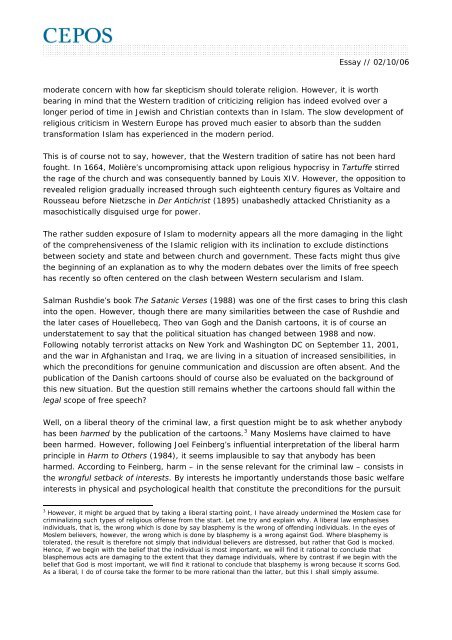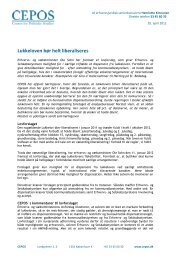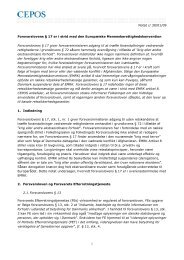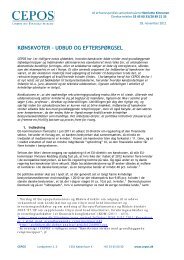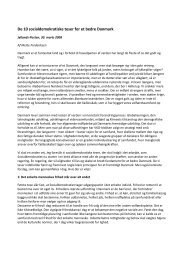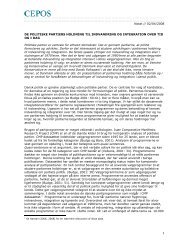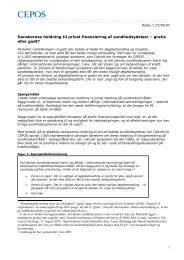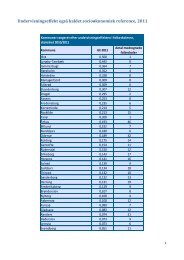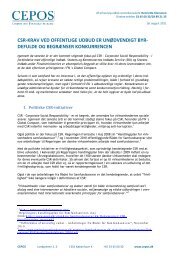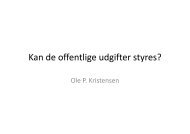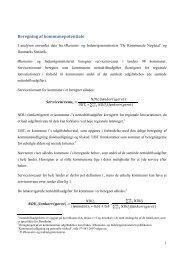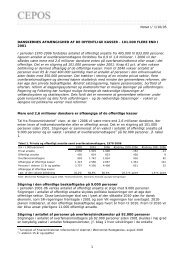FREEDOM OF SPEECH: HALAL OR HARAM - Cepos
FREEDOM OF SPEECH: HALAL OR HARAM - Cepos
FREEDOM OF SPEECH: HALAL OR HARAM - Cepos
Create successful ePaper yourself
Turn your PDF publications into a flip-book with our unique Google optimized e-Paper software.
Essay // 02/10/06moderate concern with how far skepticism should tolerate religion. However, it is worthbearing in mind that the Western tradition of criticizing religion has indeed evolved over alonger period of time in Jewish and Christian contexts than in Islam. The slow development ofreligious criticism in Western Europe has proved much easier to absorb than the suddentransformation Islam has experienced in the modern period.This is of course not to say, however, that the Western tradition of satire has not been hardfought. In 1664, Molière’s uncompromising attack upon religious hypocrisy in Tartuffe stirredthe rage of the church and was consequently banned by Louis XIV. However, the opposition torevealed religion gradually increased through such eighteenth century figures as Voltaire andRousseau before Nietzsche in Der Antichrist (1895) unabashedly attacked Christianity as amasochistically disguised urge for power.The rather sudden exposure of Islam to modernity appears all the more damaging in the lightof the comprehensiveness of the Islamic religion with its inclination to exclude distinctionsbetween society and state and between church and government. These facts might thus givethe beginning of an explanation as to why the modern debates over the limits of free speechhas recently so often centered on the clash between Western secularism and Islam.Salman Rushdie’s book The Satanic Verses (1988) was one of the first cases to bring this clashinto the open. However, though there are many similarities between the case of Rushdie andthe later cases of Houellebecq, Theo van Gogh and the Danish cartoons, it is of course anunderstatement to say that the political situation has changed between 1988 and now.Following notably terrorist attacks on New York and Washington DC on September 11, 2001,and the war in Afghanistan and Iraq, we are living in a situation of increased sensibilities, inwhich the preconditions for genuine communication and discussion are often absent. And thepublication of the Danish cartoons should of course also be evaluated on the background ofthis new situation. But the question still remains whether the cartoons should fall within thelegal scope of free speech?Well, on a liberal theory of the criminal law, a first question might be to ask whether anybodyhas been harmed by the publication of the cartoons. 3 Many Moslems have claimed to havebeen harmed. However, following Joel Feinberg’s influential interpretation of the liberal harmprinciple in Harm to Others (1984), it seems implausible to say that anybody has beenharmed. According to Feinberg, harm – in the sense relevant for the criminal law – consists inthe wrongful setback of interests. By interests he importantly understands those basic welfareinterests in physical and psychological health that constitute the preconditions for the pursuit3 However, it might be argued that by taking a liberal starting point, I have already undermined the Moslem case forcriminalizing such types of religious offense from the start. Let me try and explain why. A liberal law emphasisesindividuals, that is, the wrong which is done by say blasphemy is the wrong of offending individuals. In the eyes ofMoslem believers, however, the wrong which is done by blasphemy is a wrong against God. Where blasphemy istolerated, the result is therefore not simply that individual believers are distressed, but rather that God is mocked.Hence, if we begin with the belief that the individual is most important, we will find it rational to conclude thatblasphemous acts are damaging to the extent that they damage individuals, where by contrast if we begin with thebelief that God is most important, we will find it rational to conclude that blasphemy is wrong because it scorns God.As a liberal, I do of course take the former to be more rational than the latter, but this I shall simply assume.3


